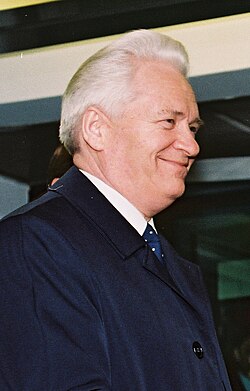| Post | Name | Period |
|---|
| Chairman of the KGB of the RSFSR | Viktor Ivanenko (acting) | 5 May [8] — 10 July 1991 |
| Chairman of the State Committee for Antimonopoly Policy and Support for New Economic Structures | Valery Chernogorodsky | 11 October 1990 — 10 July 1991 |
| Chairman of the State Committee on Architecture and Construction | Boris Furmanov | 11 October 1990 — 10 July 1991 |
| Chairman of the State Committee for Defence and Security | Konstantin Kobets | 31 January [9] – 5 May 1991 |
| Chairman of the State Committee of Defence Issues | 17 May [10] – 10 July 1991 |
| Chairman of the State Committee for Ecology and Nature Management | Igor Gavrilov | 14 July 1990 [4] – 10 July 1991 |
| Chairman of the State Committee for Economy | Gennady Filshin | 14 July 1990 [4] – 13 February 1991 |
| Chairman of the State Committee for Economic Reform | Grigory Yavlinsky | 14 July [4] – 22 November 1990 |
| Chairman of the State Committee on Employment | Anatoly Arzamastsev | 7 June – 10 July 1991 |
| Chairman of the State Committee on Geology and Subsoil Use | Dmitry Fyodorov | 14 July 1990 [4] – 10 July 1991 |
| Chairman of the State Committee on Housing and Communal Services | Alexey Poryadin | 8 February – 10 July 1991 |
| Chairman of the State Committee on Land Reform | Viktor Khlystun | 31 October 1990 [7] – 10 July 1991 |
| Chairman of the State Committee on Liquidation of the Consequences of the Chernobyl disaster | Semyon Voloshchuk | 11 October 1990 – 10 July 1991 |
| Chairman of the State Committee for the Material and Technical Support of Republican and Regional Programs | Vladimir Vozhagov | 14 July 1990 [4] – 10 July 1991 |
| Chairman of the State Committee for Nationalities | Leonid Prokopyev | 31 October 1990 [7] – 10 July 1991 |
| Chairman of the State Committee on Physical Culture and Sports | Vasily Machuga | 8 September 1990 — 10 July 1991 |
| Head of the Russian Rescue Corps | Sergey Shoigu | 17 April [11] — 10 July 1991 |
| Chairman of the State Committee on the Socio-Economic Development of the North | Yevgeny Komarov | 11 October 1990 — 10 July 1991 |
| Chairman of the State Committee on State Property Management | Mikhail Maley | 31 October 1990 [7] — 10 July 1991 |
| Chairman of the State Committee for Sanitary and Epidemiological Surveillance | Yevgeny Belyayev | 30 May – 10 July 1991 |
| Chairman of the State Committee for Science and Higher Education | Nikolay Malyshev | 14 July 1990 [4] – 10 July 1991 |
|
|---|
| Chief Executive Officer of the Council of Ministers | Aleksandr Sterligov | 14 July [4] – 31 October 1990 |
| Alexander Tretyakov | 29 November 1990 – 10 July 1991 |
